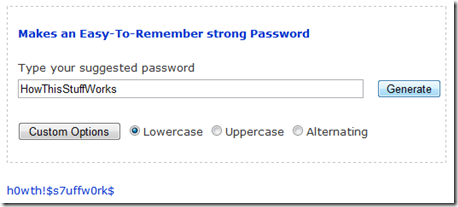

- MEMORABLE PASSWORD GENERATOR FOR FREE
- MEMORABLE PASSWORD GENERATOR GENERATOR
- MEMORABLE PASSWORD GENERATOR CODE
MEMORABLE PASSWORD GENERATOR CODE
Use yield anywhere in a function, and it's a generator (whether or not the code path of a particular call ever reaches a yield) and return just ends generation (while maybe hiding some data in the StopIteration exception).throw() on instances of the generator and manually advancing it with next(genobj)), the return value of a generator won't be seen. Outside of rare cases involving using generators as coroutines (where you're using. Is there a way to directly return a generator expression from df.to_dict(orient='records') instead of a list in order to reduce the memory footprint?Īs you can see, your return value does get "returned" in a sense (it's not completely discarded), but it's never seen by anything iterating normally, so it's largely useless.

Furthermore, calling iter(df.to_dict(orient='records')) would return the desired generator, but would not reduce the required memory footprint as the list is created intermediately. I could certainly circumvent this issue by processing the dataframe chunk-wise and generate the list of dictionaries for each chunk which is then passed to the API.

As my dataframe can get rather large, this might lead to memory issues especially as the code might be executed on lower spec target systems. When dealing with lists, the complete memory required to store the list items, is reserved/allocated. Resulting transformation depends on the orient parameter.įor my case, passing orient='records', a list of dictionaries is returned. Return a object representing the DataFrame. As stated in the docs, the returned value depends on the orient option:

The required dictionaries can be generated by calling the. StrongPassword.I am working on a large Pandas DataFrame which needs to be converted into dictionaries before being processed by another API.
MEMORABLE PASSWORD GENERATOR FOR FREE
If macOS’ built-in Password Generator doesn’t allow you to get a random password that suits your needs, for example if you need a memorable password, you can get the StrongPassword.app for FREE from the Mac AppStore. then, switch back to the Keychain Access window and close it.switch to the window where you need to paste the new password.in the Password Assistant window, set the type of password you need.note : leave the Keychain Access window in the background, as trying to close it will also close the Password Assistant window.at “Password”, on the right, click the ‘black key’-button.click on the Plus-sign button ( or press the CMD + N key combo on your keyboard ).User’s Home Folder > Applications > Utilities > KeychainAccess.app.Close previous window (that is now in the background) by clicking Cancel-button.now Password Assistant opens in a separate window.Apple Menu > System Prefs > Users & Groups > Change Password > Key Icon.Luckily, macOS has a Password Generator built-in… only tricky thing is it’s a little hard to access… there are 2 ways to get the Password Generator to start up (and an alternative in case you need extra features) : However : this feature is Safari-only (as the name Safari Strong Password suggests), so if you need to manually type a new password into an app (or anything outside of Safari) this automatic suggestion won’t kick into play… When using Safari on macOS, Safari will automatically suggest a Safari Strong Password (and backs it up to iCloud) whenever a field where you need to manually type a new password… How can I easily generate a random strong password ? I need to generate a random password for a new online account for an app, but for some reason, macOS doesn’t suggest a Strong Password as usual…


 0 kommentar(er)
0 kommentar(er)
